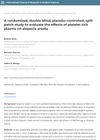21 citations,
May 2017 in “Paediatric drugs” Individualized treatment plans are crucial for children with alopecia areata, with promising options like JAK inhibitors showing significant hair regrowth.
18 citations,
July 2016 in “Clinics in dermatology” Nutrition affects skin health differently based on age and condition.
15 citations,
August 2013 in “Gene” The MTHFR C677T mutation may increase the risk of alopecia areata in the Turkish population.
[object Object] 14 citations,
December 2017 in “Journal of Investigative Dermatology Symposium Proceedings” New therapies for alopecia areata show potential but need more research.
 9 citations,
January 2018 in “International Journal of Trichology”
9 citations,
January 2018 in “International Journal of Trichology” A woman's hair loss from graft versus host disease helps understand similar hair loss conditions.
5 citations,
July 2020 in “Recent patents on inflammation & allergy drug discovery” Childhood Alopecia Areata causes hair loss and requires varied treatments, with psychological support being crucial.
 4 citations,
January 2023 in “Frontiers in Immunology”
4 citations,
January 2023 in “Frontiers in Immunology” Shorter telomeres in white blood cells may increase the risk of a common type of hair loss.
 4 citations,
November 2021 in “Journal of Clinical Medicine”
4 citations,
November 2021 in “Journal of Clinical Medicine” Higher levels of CCL7 are linked to more severe hair loss in alopecia areata patients.
 4 citations,
November 2021 in “Cancers”
4 citations,
November 2021 in “Cancers” The document concludes that understanding and managing hair loss in cancer patients is important, and more research is needed for better treatments.
 4 citations,
May 2012 in “Journal of Investigative Dermatology”
4 citations,
May 2012 in “Journal of Investigative Dermatology” The symposium concluded that a specific lipid might cause hair loss, inflammation is a key factor, and stem cells in bald scalps aren't working right, suggesting new treatment targets.
3 citations,
April 2023 in “Dermatologica Sinica” PRP treatment may help with alopecia areata, especially in newer cases.
 3 citations,
April 2022 in “Microorganisms”
3 citations,
April 2022 in “Microorganisms” People with severe hair loss (Alopecia Areata) have different scalp bacteria than healthy people, which might help predict the condition's progress.
 2 citations,
June 2023 in “Indian journal of dermatology, venereology, and leprology”
2 citations,
June 2023 in “Indian journal of dermatology, venereology, and leprology” Janus kinase inhibitors can regrow hair in alopecia areata but may cause side effects and hair loss may return if treatment stops.
 2 citations,
January 2020 in “Skin appendage disorders”
2 citations,
January 2020 in “Skin appendage disorders” Early onset, severe types, nail changes, family history, and body hair loss worsen alopecia areata prognosis; sticking to treatment helps.
 1 citations,
January 2024 in “Journal of the American Academy of Dermatology”
1 citations,
January 2024 in “Journal of the American Academy of Dermatology” COVID-19 vaccines have been linked to an increase in hair loss conditions.
 1 citations,
September 2023 in “JAAD case reports”
1 citations,
September 2023 in “JAAD case reports” Mogamulizumab, a skin cancer drug, may cause hair loss similar to alopecia areata.
 1 citations,
March 2023 in “Clinical, Cosmetic and Investigational Dermatology”
1 citations,
March 2023 in “Clinical, Cosmetic and Investigational Dermatology” Current treatments for Alopecia Areata have mixed success, and there's a need for better, more accessible options and support for affected individuals.
1 citations,
January 2021 in “Menoufia Medical Journal” Alopecia areata may be linked to heart issues.
 November 2024 in “Journal of Investigative Dermatology”
November 2024 in “Journal of Investigative Dermatology” TGF-β signaling is essential for new hair growth after wounds.
 August 2024 in “Frontiers in Pharmacology”
August 2024 in “Frontiers in Pharmacology” Cyclosporine may cause hair loss, so patients need monitoring.
 June 2024 in “Australasian Journal of Dermatology”
June 2024 in “Australasian Journal of Dermatology” Tofacitinib is safe and effective for treating moderate-to-severe alopecia areata.
 May 2024 in “Clinical Cosmetic and Investigational Dermatology”
May 2024 in “Clinical Cosmetic and Investigational Dermatology” Manipulating cell cleanup processes could help treat hair loss.
March 2024 in “Nutrients” Alopecia Areata is linked to specific gut bacteria and metabolites, indicating a complex gut microbiome.
 September 2023 in “Journal of Cosmetic Dermatology”
September 2023 in “Journal of Cosmetic Dermatology” Finasteride was more effective than hydroxychloroquine in treating frontal fibrosing alopecia.
 September 2023 in “International Journal of Trichology”
September 2023 in “International Journal of Trichology” Adipose-derived stem cells may help with hair loss, but more research is needed.
 July 2023 in “IntechOpen eBooks”
July 2023 in “IntechOpen eBooks” Some types of hair loss can be reversed, others are permanent, and treatments vary by type.
[object Object]  January 2023 in “Indian Dermatology Online Journal”
January 2023 in “Indian Dermatology Online Journal” No single ideal JAK inhibitor for alopecia areata has been determined; JAK3 inhibitors may be promising with fewer side effects.
 June 2022 in “Frontiers in Immunology”
June 2022 in “Frontiers in Immunology” Tofacitinib regrew hair in a man with total hair loss but raised cytokine levels, needing more research on possible side effects.
 January 2022 in “Stem cell biology and regenerative medicine”
January 2022 in “Stem cell biology and regenerative medicine” New biofabrication technologies could lead to treatments for hair loss.
 July 2018 in “International Journal of Research in Medical Sciences”
July 2018 in “International Journal of Research in Medical Sciences” Platelet rich plasma was slightly more effective than no treatment for hair loss in alopecia areata patients.





















